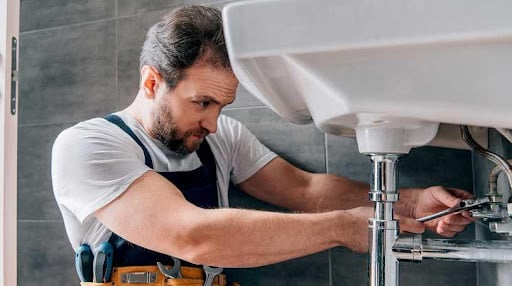Whether you’re a seasoned professional or a newbie to the plumbing industry, having the right tools is essential for doing the job correctly and efficiently. As a professional plumber, it’s critical to have access to all the necessary tools and equipment to get the job done right. Let’s look at essential tools every plumber should have in their toolbox.

1. Pipe Wrench
Even if it’s only a weekend project, every plumber should have a pipe wrench. Pipe wrenches tighten and loosen the nuts that hold the item together. If you need to work on pipelines, you must have a pipe wrench in your toolkit. Essentially, these equipment exist in various sizes, and professional plumbers carry a comprehensive collection of these instruments. When it comes to plumber hand tools, the pipe wrench is the most commonly used.
2. Pipe Cutter
Pipe cutters are an essential tool for any professional plumber because they allow them to easily cut through pipes of various sizes without damaging them. They can get easily used on copper, brass, plastic, steel, cast iron, lead, and aluminum pipes. Pipe cutters come in different styles that work on different types of materials; make sure you choose the appropriate one for each job!
3. Pump Pliers
Pump pliers, sometimes water pump pliers, are used to gripping, hold, compress, or apply pressure to an item. These plumbing tools and equipment are unique because they provide the best grip and can have and turn a broad range of industrial workpieces, including nuts and bolts. Because of their serrated jaws, it is possible. Water pump pliers are commonly used in domestic, plumbing, and automotive applications to cut thick metal.
4. Chain Pipe Wrench
It is a sort of adjustable pipe wrench with a forged steel handle and a big sprocket chain. A chain pipe wrench looms the chain around the pipe and inserts the sprockets into slots on the rear of the handle.
5. Hammers and Screwdrivers
Every plumber needs a hammer and several screwdrivers in their toolbox because these tools can help with nearly every task they may encounter while on the job. Hammers are especially helpful when removing nails from walls or opening stuck valves, while screwdrivers are great for loosening screws or tightening them back up if needed. Make sure your hammer has both a claw head and a flathead so you can use it for multiple tasks! And remember about screwdriver sets which include various sizes of both flat and heads; these will come in handy more often than not!
6. Channel-Type Pliers
Channel-type pliers are used to grabbing the smooth surface of the pipe that requires a stronger grip when opening or fitting. A moveable handle on channel-type pliers allows the jaws to adjust for optimal gripping strength. The inside of the jaws is saw-toothed to keep them from sliding.
7. Tape
The plumber’s tape is applied to threaded plumbing connections to prevent leaks. Teflon tape is another name for it. It’s a thin white tape that wraps over the threads of pipes and fittings before attaching them.
8. Utility Knife
Utility knives are also known as folding knives, Stanley knives, box cutters, X-Acto knives, etc. A utility knife comes with a sharp blade that can cut various materials. Professionals use it to finish the ends of plastic pipes. The utility knife includes a retractable mechanism that ensures safety while working.
9. Plunger
A plunger is a standard plumbing equipment found in every home. Plungers primarily use water and air pressure to eliminate drain obstructions. Expert plumbers use a flange plunger for toilet bowls which can be used the same way as a standard plunger. The plunger unclogs sink, tub, shower, and floor drain obstructions.
10. Hand Auger
A hand auger is also known as a plumber’s snake, a drain snake, or a toilet jack. It removes clogs from drain pipes. A hand auger’s disk-shaped crank houses a long and flexible steel wire. A pistol grip allows the operator to exert solid pressure on the flexible steel cable. Flexible steel wires reach deep into blocked drains in Melbourne and eliminate obstructions.
11. Basin Wrench
The T-shaped basin wrench is proper when working on faucets or flexible supply tube nuts in difficult-to-reach spots. A plumber might need one to work in tight locations, such as beneath the sink.
12. Hole Saw Kit
Plumbers must drill holes through hardwood studs, plasterboard, plastic, and occasionally metal for more sophisticated interventions. A hole saw speeds up the procedure, allowing plumbers to work quicker and achieve more exact results with less damage.
13. Eyewear
Lightweight safety glasses keep you and your team safe. By encouraging your employees to wear personal protection equipment, you demonstrate that you care about their health and safety while protecting your organization.
14. Heat Shields
Hot water plumbers must utilize essential safety equipment when soldering pipes to safeguard themselves and the property where they work. Heat shields are critical to any toolbox containing a plumber’s torch.
Conclusion
Having the right tools is critical for being an effective professional plumber. Whether you’re new to plumbing or experienced in the field, having all of these essential tools will ensure that you can quickly and efficiently handle any problem that arises while on the job promptly and efficiently without compromising quality or safety standards. Investing in high-quality tools will save time, money, and hassle while protecting your hard-earned reputation, and having NLK Plumbing’s reliable plumbing professionals is key to a successful plumbing project.
Interesting Related Article: “How to Hire a Plumber: What You Need to Know“

